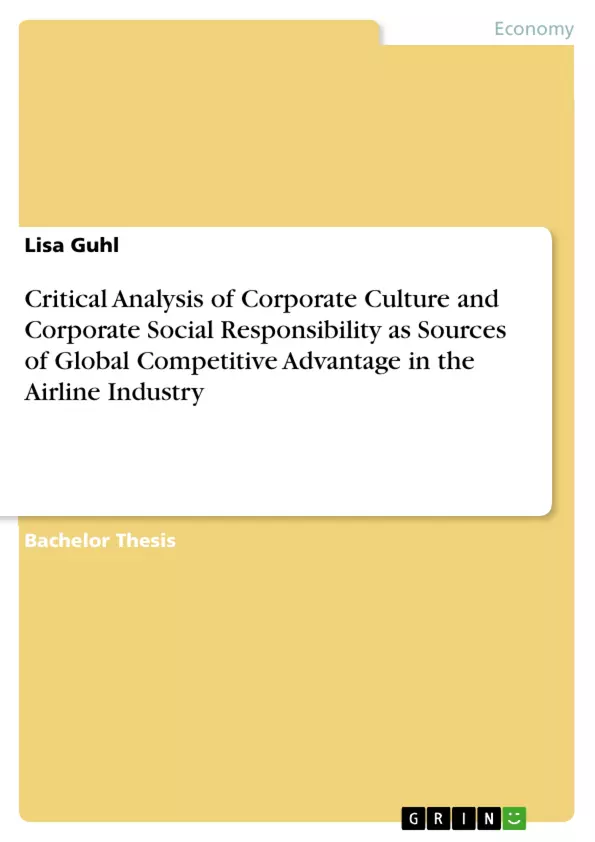Since globalization started companies have been looking for ways to compete successfully on a global scale. Trends in the global environment, such as worldwide sourcing models requiring the management of cultural differences, as well as rapid communication and technology innovation, are still challenging for many industries.
The airline industry being itself a reason for an increasingly borderless world also faces these global trends and fierce competition. Numerous factors have caused a downward trend of profits in this industry. The first factor has been the deregulation process. Under regulation airlines could not compete on price. Therefore, differentiation was only possible by customer service or on-board entertainment. With the start of de-regulation most customers could not find much difference between the offerings of major airlines and became indifferent about which airline to choose.
Airline tickets started to become a kind of commodity goods. So, although deregulation was thought to lead to lower entry barriers, decreasing concentration and competitive prices, practice turned out to be different: expansion and alliance strategies of leading airlines have increased concentration. Besides liberalization, other factors have been the economic slowdown in many countries, terrorism, and rising costs for fuel, labour, maintenance, and security. Also rising customer expectations e.g. regarding convenience, entertainment, innovation, and value for money require the airline industry to change dynamically. Moreover, airlines face demands for CSR and sustainable travel, including pollution control and reduction of noise and CO2 emissions.
Competition from low-cost carriers also gains in importance since their share of global capacity increased to more than 25 % in 2013. So, even if demand for air transportation has grown by an average of 9 % per year since 1960, and global airline revenues reached a new high of US$708 billion in 2013, airlines need to find ways to stand global competition as their environment, as well as economic and social frameworks potentially endanger profits and economic survival.
Inhaltsverzeichnis (Table of Contents)
- Introduction
- Terminology
- Problem Statement and Objectives
- Course of Investigation
- Theoretical Foundation
- Competitive Strategy
- Generic Strategies
- Competitive Advantage
- Resource-based View
- History and Underlying Assumptions
- VRIO Model
- Concept Development
- Question of Value and Rarity
- Question of Imitability and Organization
- Resources and Competitive Advantage
- Corporate Culture
- CSR
- History
- Pyramid of CSR
- Critical Appraisal
- Practical Implementation in the Airline Industry
- Strategy
- Strategic Purpose
- SWOT Internal and External Analysis
- Strategic Implications
- Strengths
- Weaknesses
- Opportunities
- Threats
- Corporate Culture
- Cultural Values and Aspects
- Source of Competitive Advantage
- CSR
- Initiatives and Dimensions
- Source of Competitive Advantage
- Critical Appraisal
- Critical Analysis and Recommendation
- Effects of Corporate Culture
- Management of Corporate Culture
- Effects of CSR
- Image and Reputation
- Stakeholder Management
- Financial Performance
- Management of CSR
Zielsetzung und Themenschwerpunkte (Objectives and Key Themes)
This thesis aims to critically analyze the role of corporate culture and corporate social responsibility (CSR) as sources of global competitive advantage in the airline industry. It explores the theoretical frameworks underlying these concepts and examines their practical implementation in the industry.
- Competitive advantage through corporate culture and CSR
- The impact of corporate culture and CSR on airline industry performance
- The role of resources and capabilities in achieving sustainable competitive advantage
- The relationship between corporate culture, CSR, and stakeholder management
- The challenges and opportunities associated with implementing CSR initiatives in the airline industry
Zusammenfassung der Kapitel (Chapter Summaries)
The introduction defines key terminology, outlines the problem statement, and sets out the objectives and course of investigation. Chapter 2 provides a theoretical foundation by examining competitive strategy, resource-based view, corporate culture, and CSR. It analyzes the historical development of these concepts and explores their relevance to achieving competitive advantage.
Chapter 3 delves into the practical implementation of corporate culture and CSR in the airline industry. It examines the strategic purpose, SWOT analysis, and cultural values of airlines, as well as their CSR initiatives and their potential to generate competitive advantage. Chapter 4 critically analyzes the effects of corporate culture and CSR on airlines, focusing on their impact on image, reputation, stakeholder management, and financial performance. It also discusses the management of these factors for achieving sustainable success.
Schlüsselwörter (Keywords)
This thesis focuses on the following key concepts and topics: competitive advantage, corporate culture, corporate social responsibility, airline industry, resource-based view, SWOT analysis, stakeholder management, sustainability, and financial performance.
Frequently Asked Questions
How can corporate culture provide a competitive advantage for airlines?
A strong, unique corporate culture can lead to better customer service and employee engagement, which are difficult for competitors to imitate, thus creating a sustainable advantage.
What is the impact of deregulation on the airline industry?
Deregulation increased price competition, lowered entry barriers, and turned airline tickets into a commodity, forcing airlines to find new ways to differentiate themselves.
What is the VRIO model in strategic management?
VRIO stands for Value, Rarity, Imitability, and Organization. It is used to evaluate if a company's resources can provide a sustained competitive advantage.
Why is CSR important for modern airlines?
Airlines face growing pressure to reduce CO2 emissions and noise. CSR initiatives improve reputation, manage stakeholder expectations, and can lead to long-term financial stability.
How do low-cost carriers affect the global market?
Low-cost carriers have significantly increased their market share (over 25% by 2013), putting immense pressure on traditional airlines' profit margins and operational models.
- Quote paper
- Lisa Guhl (Author), 2015, Critical Analysis of Corporate Culture and Corporate Social Responsibility as Sources of Global Competitive Advantage in the Airline Industry, Munich, GRIN Verlag, https://www.grin.com/document/342719



